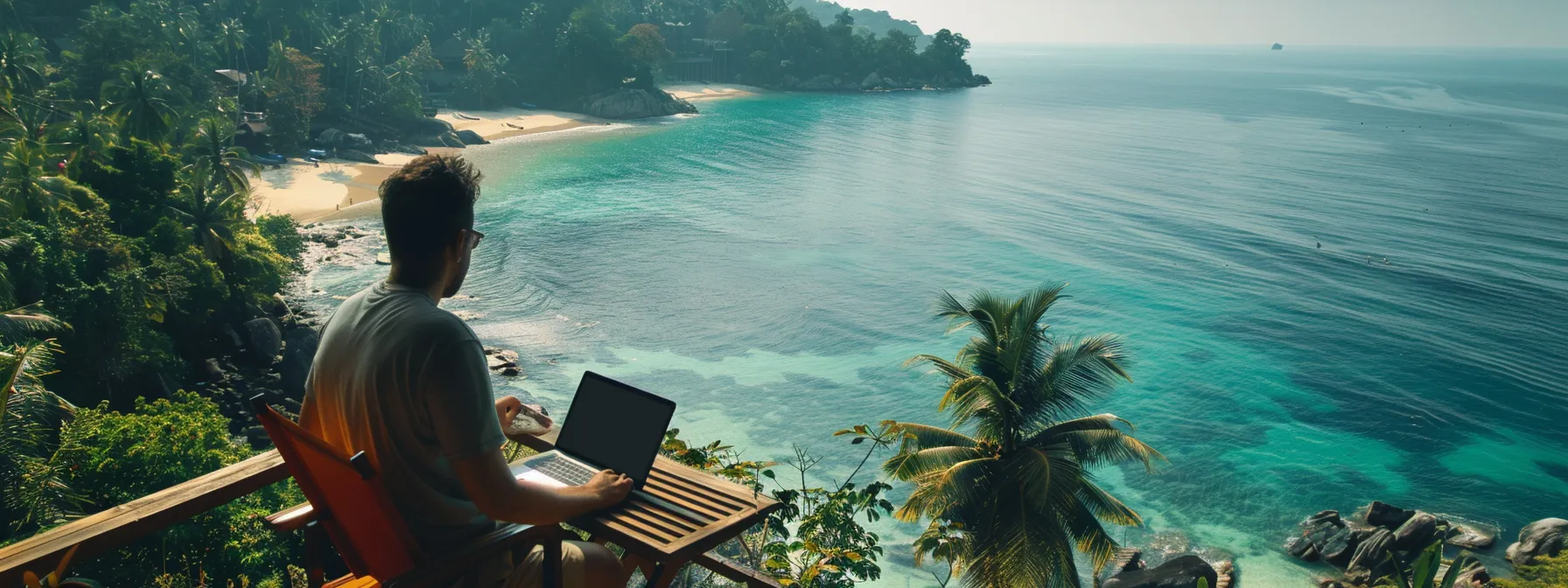Digital Nomad Visanavigating the digital nomad visa processdigital nomad visa processnavigating the digital nomad visa process
Navigating the digital nomad visa processUnderstanding country-specific nomad visa eligibility criteriaNomadic bliss uncovering lifestyle perksDigital Nomaddigital nomad visa processnavigating the digital nomad visa processNavigating the Digital Nomad Visa Processnavigating the digital nomad visa process
Table Of Contents:
- Navigating the Digital Nomad Visa Process – ExploreTraveler
- Key Takeaways
- What Is a Digital Nomad Visa?
- Who Offers Digital Nomad Visas?
- Antigua & Barbuda
- The Bahamas
- Barbados
- Bermuda
- Cabo Verde
- Costa Rica
- Curaçao
- Czech Republic
- Dominica
- Estonia
- Iceland
- Malta
- Mauritius
- Montserrat
- Portugal
- Seychelles
- Advantages and Disadvantages of Digital Nomad Visas
- Advantages
- Disadvantages
- Digital Nomads vs. Remote Workers
- What Is a Digital Nomad?
- What Other Countries Offer Digital Nomad Visas?
- The Bottom Line
- Frequently Asked Questions
- How long does a typical digital nomad visa last?
- What are the income requirements for obtaining a digital nomad visa?
- Can family members join you on a digital nomad visa?
- Do you need health insurance to qualify for a digital nomad visa?
- Are digital nomad visas renewable after they expire?
- Conclusion
Navigating the Digital Nomad Visa Process – ExploreTraveler
Digital nomad visas offer a gateway for location-independent professionals to live and work abroad legally. These special residence permits allow you to maintain your income from foreign sources while experiencing new cultures and environments. To qualify, you typically need to prove a stable income and have a valid bank account. In this article, we’ll explore the ins and outs of digital nomad visas, including which countries offer them and how they differ from traditional employment visas.Navigating the digital nomad visa process
Key Takeaways
- Digital nomad visas offer opportunities to work remotely in various countries for extended periods
- Different countries have unique requirements and benefits for their digital nomad visa programs
- Balancing work responsibilities with exploring new cultures is essential for successful digital nomadism
- Reliable internetinfrastructure and cost of living are crucial factors when choosing a destination
- Flexibility and adaptability are key to thriving in the digital nomad lifestyle
What Is a Digital Nomad Visa?

A Digital Nomad Visa allows you to live and work remotely in a foreign country for an extended period. This type of visa caters specifically to location-independent professionals who earn income from sources outside their host country. Digital Nomad Visas have gained popularity as remote work becomes increasingly common worldwide.
Countries like Portugal offer these visas to attract skilled professionals and boost their economies. You can stay in Portugal for up to one year with a Digital Nomad Visa, enjoying the country’s rich culture and beautiful landscapes while working remotely. This visa also provides a pathway to potential long-term residency or citizenship in Portugal. Navigating the Digital Nomad Visa Process
The European Union has several member states that offer Digital Nomad Visas, making it easier for you to explore multiple countries within the Schengen Area. These visas typically require proof of income, health insurance, and a clean criminal record. You must also demonstrate your ability to work remotely and maintain employment outside the host country.
Digital Nomad Visas offer numerous benefits, including legal residency, access to local services, and the opportunity to immerse yourself in new cultures. However, it’s crucial to understand the specific requirements and limitations of each country’s visa program. Here’s a comparison of Digital Nomad Visa features in popular destinations:
By obtaining a Digital Nomad Visa, you can legally work remotely while experiencing life in a new country. This opportunity allows you to broaden your horizons, network with international professionals, and potentially pave the way for long-term residency or citizenship in your chosen destination. Visit navigating the digital nomad visa process for more information.
Digital nomad visas open doors to exciting new possibilities. Let’s explore which countries welcome remote workers with open arms.
Who Offers Digital Nomad Visas?

As remote work gains traction globally, an increasing number of countries are offering Digital Nomad Visas to attract skilled professionals. These visas provide unique opportunities for you to live and work abroad while exploring new cultures. From Caribbean paradises to European tech hubs, various destinations have tailored their immigration policies to accommodate digital nomads. Each country has its own set of requirements, including minimum income thresholds, travel visa fees, and mandatory health or travel insurance. Some locations even offer tax incentives to make their programs more appealing. Let’s explore some popular countries that welcome digital nomads with open arms. income criteria
Antigua & Barbuda
Antigua & Barbuda offers a Nomad Digital Residence program, allowing you to live and work on the twin-island paradise for up to two years. This Caribbean nation provides an ideal setting for digital nomads seeking a tropical lifestyle with reliable internet connectivity. You can enjoy pristine beaches and a laid-back atmosphere while maintaining your remote work commitments.
To obtain the digital visa for Antigua & Barbuda, you must prove an annual income of at least $50,000 and pay a fee of $1,500 for a single applicant. The application process is straightforward, and you can typically receive approval within 7-10 business days. This program offers a unique opportunity to experienceCaribbeanculture while potentially working towards a second passport.
Antigua & Barbuda boasts a growing digital nomadcommunity, with co-working spaces and networking events available in major towns. The government has invested in improving internetinfrastructure to support remote workers, ensuring you can stay connected while enjoying the island‘s natural beauty. By choosing Antigua & Barbuda for your digital nomad journey, you’ll gain access to a vibrant expat community and the chance to explore neighboring Caribbean islands.
The Bahamas
The Bahamas offers a unique digital nomad visa program called the Bahamas Extended Access Travel Stay (BEATS), allowing you to work remotely from this tropical paradise for up to one year. Unlike some digital nomad visa countries in the Schengen Area, such as Spain or Italy, the Bahamas provides a more laid-back Caribbean atmosphere while still offering modern amenities and reliable internet infrastructure.
To qualify for the BEATS program, you must demonstrate a minimum annual income of $75,000 and pay a $1,000 application fee. The Bahamas‘ digital nomad visa offers a compelling alternative to European destinations, providing year-round warm weather and stunning beaches just a short flight from the United States.
While working from the Bahamas, you can easily explore its 700 islands and cays, each offering unique experiences and landscapes. This nomad visa allows you to immerse yourself in Bahamian culture, enjoy world-class water sports, and network with other digital nomads in a relaxed, tropical setting.
Barbados
Barbados offers the Welcome Stamp Visa, allowing you to work remotely from this Caribbean paradise for up to 12 months. Unlike Croatia, which requires proof of passive income, Barbados focuses on your ability to earn a minimum of $50,000 annually through remote work or self-employment. You must also provide a clean criminal record and proof of health insurance coverage for your stay.
The application process for the Barbados Welcome Stamp is straightforward, requiring you to submit necessary documents online, including your work contract or proof of self-employment. This digital nomad visa allows you to immerse yourself in Bajan culture while maintaining your professional commitments, offering a unique blend of tropical living and career development. Navigating the digital nomad visa process
By choosing Barbados as your digital nomad destination, you gain access to world-class beaches, a vibrant expat community, and modern infrastructure to support your remote work needs. The island‘s commitment to attracting digital nomads has resulted in improved internet connectivity and the development of co-working spaces, ensuring you can maintain productivity while enjoying the laid-back Caribbean lifestyle.
Bermuda
Bermuda‘s Work from Bermuda Certificate program offers a unique opportunity for digital nomads seeking a blend of British charm and tropical paradise. Unlike the United Kingdom or Japan, Bermuda provides a one-year visa that allows you to work remotely while enjoying its pristine beaches and vibrant culture. This program serves as an excellent stepping stone for those considering permanent residency in this British Overseas Territory.
To qualify for Bermuda‘s digital nomad visa, you must demonstrate a clean criminal record, proof of employment or self-employment, and adequate health insurance coverage. The application process is streamlined, with no need to visit a diplomatic mission in person. Bermuda‘s immigration policies cater to remote workers, offering a seamless transition into island life while maintaining your professional commitments. navigating the digital nomad visa process
By choosing Bermuda as your digital nomad destination, you gain access to world-class infrastructure, reliable internet connectivity, and a thriving expat community. The island‘s proximity to the United States and Canada makes it an attractive option for North American professionals seeking a change of scenery without venturing too far from home. Bermuda’s digital nomad visa program allows you to experience the best of island living while advancing your career goals.
Cabo Verde
Cabo Verde, a group of islands off the coast of West Africa, offers an attractive digital nomad visa program. This resident permit allows you to live and work remotely in the archipelago for up to six months, with the possibility of extension. You must provide proof of income, an insurancepolicy covering your stay, and demonstrate your ability to work remotely.
The islands boast improving broadbandinfrastructure, making it easier for digital nomads to stay connected while enjoying the stunning beaches and vibrant culture. Unlike the green card process in the United States, Cabo Verde’s digital nomad visa is designed for temporary stays, offering a unique opportunity to experience African island life without long-term commitments.
Cabo Verde’s strategic location between Europe, Africa, and the Americas makes it an ideal base for digital nomads seeking to explore multiple continents. While not part of the European Economic Area, the country’s close ties with Portugal and other European nations provide a familiar environment for many remote workers. The visa program aims to boost the local economy by attracting skilled professionals and fostering cultural exchange.
- Apply for the Cabo Verde digital nomad visa online
- Provide proof of income and remote work capabilities
- Secure appropriate health insurance coverage
- Enjoy up to six months of island living and working
- Experience the unique blend of African and Portuguese cultures
Costa Rica
Costa Rica‘s digital nomad visa offers you the chance to work remotely from this tropical paradise for up to two years. Unlike a standard tourist visa, this program allows you to stay longer and legally conduct business activities. You must prove a monthly salary of at least $3,000, which is significantly higher than the country’s minimum wage. For more details, you can check the navigating digital nomad visa income criteria.
The Costa Rican digital nomad visa doesn’t require you to establish tax residence, potentially saving you money on income taxes. However, you’ll need to consider the cost of living, which can vary depending on your chosen location within the country. Popular areas for digital nomads, such as Manuel Antonio or Santa Teresa, may have higher expenses than less touristy regions. For those navigating the visa process, navigating the digital nomad visa process provides valuable insights.
By obtaining this visa, you gain access to Costa Rica‘s renowned biodiversity, stunning beaches, and vibrant culture while maintaining your remote work. The country’s commitment to sustainability and its pura vida lifestyle make it an attractive destination for digital nomads seeking a balance between work and leisure. Navigating the digital nomad visa process can provide additional insights into making the move smoother.
Curaçao
Curaçao offers a unique digital nomad visa program, allowing you to work remotely from this Caribbean paradise for up to six months. Unlike Estonia‘s e-Residency program, Curaçao‘s visa focuses on attracting temporary residents rather than providing digital identity documents. You must meet an income requirement of at least $2,700 per month to qualify for this visa.
The application process for Curaçao‘s digital nomad visa is straightforward, requiring proof of income, health insurance, and a valid passport. Unlike Greece, which offers a longer-term visa, Curaçao‘s program is designed for shorter stays, allowing you to experience the island‘s vibrant culture and stunning beaches without committing to a full year. Here’s a comparison of digital nomad visa requirements in the Caribbean region: navigating the digital nomad visa process
By choosing Curaçao as your digital nomad destination, you gain access to a thriving expat community, reliable internetinfrastructure, and a unique blend of Dutch and Caribbean cultures. The island‘s strategic location also makes it an ideal base for exploring other parts of the Caribbean and South America during your stay.
Czech Republic
The Czech Republic offers a long-term visa for digital nomads, catering to freelancers and remote workers seeking to experience Central European culture. This visa allows you to stay in the country for up to one year, providing ample time to explore Prague’s historic streets and the nation’s picturesque countryside. Unlike Panama, which focuses on retirees, the Czech Republic‘s visa program targets younger professionals engaged in entrepreneurship and remote work.
To qualify for the Czech Republic‘s digital nomad visa, you must demonstrate sufficient income to support yourself during your stay. You’ll need to provide a bank statement showing at least $5,500 in savings, along with proof of accommodation and health insurance coverage. This visa offers a unique opportunity to immerse yourself in Czech culture while maintaining your professional commitments.
The application process for the Czech Republic‘s digital nomad visa requires thorough documentation and may take several weeks to complete. You’ll need to submit your application at a Czech embassy or consulate in your home country, providing detailed information about your work and financial situation. Once approved, you can enjoy the benefits of living in a country known for its rich history, affordable cost of living, and central location within Europe. Navigating the digital nomad visa process
- Gather required documents, including proof of income and accommodation
- Submit your application at a Czech embassy or consulate
- Wait for approval, which typically takes several weeks
- Prepare for your move to the Czech Republic
- Explore the country’s vibrant culture and stunning landscapes while working remotely
Dominica
Dominica‘s Work in Nature (WIN) Extended Stay Visa offers digital nomads a unique opportunity to live and work remotely on the Nature Island for up to 18 months. Unlike the United Arab Emirates, which focuses on urban environments, Dominica provides a lush, tropical setting for remote workers seeking a change of pace. You’ll need to submit various documents, including proof of income and a valid passport, to apply for this visa. For more details on the application process, you might find this guide on navigating digital nomad visa income criteria helpful.
The application process for Dominica‘s digital nomad visa is more streamlined than obtaining a traditional work visa in countries like Mexico. You won’t need to secure an employmentcontract with a local company, as the visa is designed for remote workers and freelancers. This flexibility allows you to maintain your current job while experiencing life in the Caribbean. Navigating the digital nomad visa process
By choosing Dominica as your digital nomad destination, you’ll gain access to pristine beaches, rainforests, and a vibrant local culture. The country’s commitment to eco-tourism and sustainable development aligns well with the values of many remote workers. While Dominica may not offer the same level of infrastructure as larger nations, it provides a unique blend of natural beauty and professional opportunities for digital nomads. Navigating the digital nomad visa process
Estonia
Estonia‘s Digital Nomad Visa program stands out among tourism-friendly countries, offering you the chance to live and work remotely in this Baltic nation for up to one year. Unlike Malta, which focuses on attracting high-net-worth individuals, Estonia‘s visa caters to a broader range of digital professionals. You must prove a minimum monthly income of €3,504 to qualify for this visa.
The application process for Estonia‘s digital nomad visa is straightforward, with a comprehensive FAQ available on the official website to guide you through each step. Unlike Antigua and Barbuda, which offers a two-year program, Estonia‘s visa is designed for a one-year stay, allowing you to experience the country’s thriving tech scene and rich cultural heritage. You’ll need to provide proof of remote work capabilities and health insurance coverage. Navigating the digital nomad visa process
Estonia‘s digital nomad visa offers unique benefits, including the potential for tax advantages. While you’ll need to consult with a tax professional for specific advice, Estonia‘s e-Residency program and favorable incometax policies may provide opportunities to optimize your financial situation. By choosing Estonia as your digital nomad destination, you’ll gain access to a well-developed digital infrastructure and a supportive community of international professionals. navigating the digital nomad visa process
Iceland
Iceland‘s digital nomad visa offers you a unique opportunity to work remotely from this Nordic island nation for up to six months. Unlike Cape Verde, which requires a significant investment, Iceland‘s program focuses on attracting skilled professionals who can contribute to the local economy through their remote work. You must provide proof of income, health insurance, and pass a background check to qualify for this visa.
The application process for Iceland‘s digital nomad visa is straightforward, with clear guidelines available on the official immigration website. Unlike Dominica, which offers a longer stay, Iceland‘s program is designed for shorter-term remote work experiences. This visa allows you to immerse yourself in Iceland‘s stunning natural landscapes and vibrant culture while maintaining your professional commitments.
By choosing Iceland as your digital nomad destination, you gain access to world-class coworking spaces and a thriving tech community. The country’s commitment to sustainable development and renewable energy aligns well with the values of many remote workers. While living costs in Iceland may be higher than in some other digital nomad destinations, the unique experiences and networking opportunities make it an attractive option for adventurous professionals.
Malta
Malta‘s NomadResidence Permit offers you the opportunity to live and work remotely on this Mediterranean island for up to one year. Unlike Dubai, which focuses on attracting large corporations, Malta caters to individual digital nomads and freelancers. You must prove a minimum monthly income of €2,700 and provide evidence of accommodation to qualify for this visa.
The application process for Malta‘s digital nomad visa requires you to submit various documents, including a valid biometric passport and proof of health insurance. Malta‘s advanced online banking system makes it easy for you to manage your finances while living on the island. You’ll need to make a one-time payment of €300 to process your application. Navigating the digital nomad visa process
By choosing Malta as your digital nomad destination, you gain access to a thriving expat community and the possibility of investing in property. The island‘s strategic location in the heart of the Mediterranean offers unique opportunities for networking and exploring nearby European countries. Malta‘s commitment to attracting remote workers has resulted in improved digital infrastructure and coworking spaces throughout the island.navigating the digital nomad visa process
Mauritius
Mauritius offers a Premium Visa for digital nomads, allowing you to work remotely from this tropical paradise for up to one year. Unlike the Czech Republic, which focuses on attracting European professionals, Mauritius caters to a global audience seeking a unique islandexperience. You must demonstrate a minimum monthly income of $1,500 to qualify for this visa, making it more accessible than some other digital nomad destinations. navigating digital nomad visa income criteria
The cost of living in Mauritius is generally lower than in many Western countries, allowing you to stretch your money further while enjoying a high quality of life. Unlike Brazil, which has a complex tax system, Mauritius offers a favorable tax rate for foreign-sourced income, potentially saving you money during your stay. You’ll need to provide proof of accommodation and health insurance coverage when applying for the Premium Visa.
By choosing Mauritius as your digital nomad destination, you gain access to stunning beaches, diverse cultural experiences, and a growing community of remote workers. The island‘s commitment to developing its digital infrastructure ensures you can maintain productivity while enjoying the laid-back lifestyle. Here’s a comparison of digital nomad visa features in popular island destinations: digital nomad visa features in popular island destinations:
Montserrat
Montserrat‘s Remote Work Stamp program offers you the chance to live and work on this Caribbeanisland for up to 12 months. Unlike Canada‘s complex immigration laws, Montserrat‘s visa process is straightforward, requiring proof of income and health insurance. You’ll pay an application fee of $500 for individuals or $750 for families, making it an affordable option for digital nomads seeking a tropical getaway.
The visa allows for family reunification, enabling you to bring your spouse and dependent children along for the adventure. Unlike some countries that restrict marriage during temporary stays, Montserrat‘s Remote Work Stamp doesn’t impose such limitations. This flexibility makes it an attractive option for digital nomads looking to balance work and personal life in a stunning island setting.
By choosing Montserrat as your digital nomad destination, you’ll gain access to a unique blend of British and Caribbean cultures. The island‘s small population and welcoming atmosphere provide ample opportunities for networking and community engagement. While Montserrat may not offer the same level of infrastructure as larger countries, its commitment to attracting remote workers has led to improvements in internet connectivity and co-working spaces.
Portugal
Portugal‘s Digital Nomad Visa offers you the opportunity to work remotely while immersing yourself in the country’s rich culture and stunning landscapes. Unlike Romania, which focuses on attracting tech professionals, Portugal‘s program caters to a broader range of remote workers. You’ll need to prove a minimum monthly income of €2,800 to qualify for this visa, ensuring you can maintain your productivity while enjoying the Portuguese way of life.
The application process for Portugal‘s digital nomad visa is streamlined, with clear guidelines available on the official immigration website. Unlike Iceland, which offers a shorter-term program, Portugal‘s visa allows you to stay for up to one year, with the possibility of extension. This extended period gives you ample time to explore the country’s diverse regions, from the bustling cities of Lisbon and Porto to the serene beaches of the Algarve. Navigating the digital nomad visa process
By choosing Portugal as your digital nomad destination, you’ll benefit from the country’s favorable tax policies for remote workers. While you’ll need to file a tax return, Portugal‘s Non-Habitual Resident (NHR) program may offer significant tax advantages for your foreign-sourced income. This combination of cultural richness, comfortable climate, and potential financial benefits makes Portugal an attractive option for digital nomads seeking a balance between work and lifestyle.
Seychelles
Seychelles offers a digital nomad visa that allows you to work remotely from this tropical paradise for up to one year. Unlike Hungary‘s complex bureaucratic processes, Seychelles provides a straightforward application procedure for remote workers. You must demonstrate a minimum monthly income of $1,500 and provide proof of accommodation to qualify for this visa.
The Seychellesdigital nomad visa offers unique benefits compared to other destinations like Switzerland. While Switzerland focuses on attracting high-net-worth individuals, Seychelles caters to a broader range of remote workers seeking a balance between work and island life. You’ll need to obtain appropriate health insurance coverage and submit a valid travel document to complete your application. digital nomad visa income criteria
By choosing Seychelles as your digital nomad destination, you gain access to pristine beaches, diverse marine life, and a relaxed lifestyle. Unlike Costa Rica‘s longer-term visa, Seychelles offers a one-year program with the possibility of extension, allowing you to experience the islands’ unique culture and natural beauty. The government has invested in improving internetinfrastructure to support remote workers, ensuring you can maintain productivity while enjoying paradise:
- Apply for the Seychellesdigital nomad visa online
- Provide proof of income and accommodation
- Obtain comprehensive health insurance coverage
- Explore the islands’ stunning beaches and nature reserves
- Connect with a growing community of international remote workers
The world beckons with opportunities for digital nomads. Let’s explore the pros and cons of these visas to help you make an informed decision. Navigating the digital nomad visa process
Advantages and Disadvantages of Digital Nomad Visas

As you consider pursuing a digital nomad lifestyle, weighing the pros and cons of various visa options becomes crucial. From the beaches of Indonesia to the vibrant cities of South Africa, each destination offers unique opportunities and challenges. While some countries like Antigua and Barbuda provide straightforward application processes, others may require the assistance of a lawyer to navigate complex work permit regulations. Understanding the advantages and disadvantages of digital nomad visas will help you make an informed decision about your next remote work destination, ensuring you strike the right balance between professional growth and personal adventure.
Advantages
Digital nomad visas offer you the freedom to explore vibrant destinations like Lisbon while maintaining your career. Unlike traditional work visas, these programs often have streamlined application processes, eliminating the need for complex paperwork such as marriage certificates. You can immerse yourself in new cultures and environments without sacrificing your professional goals. Navigating the digital nomad visa process
Countries like New Zealand and the Netherlands attract digital nomads with their high quality of life and robust digital infrastructure. These visas provide legal status and access to local services, ensuring you can focus on your work without worrying about visa violations. You’ll have the opportunity to network with like-minded professionals and potentially discover new business opportunities. Understanding country specific nomad visa eligibility criteria
Destinations such as Bermuda offer tax advantages for digital nomads, potentially allowing you to optimize your financial situation. Many digital nomad visa programs provide flexibility in terms of duration and renewal options, giving you the chance to extend your stay if you fall in love with a particular location. You can build a global network of contacts and experiences that may benefit your career long after your nomadic lifestyle ends.
Disadvantages
While digital nomad visas offer exciting opportunities, they come with challenges. You may face difficulties securing long-term accommodation, as many landlords in countries like South Korea prefer traditional leases. The pandemic has also highlighted the potential risks of being abroad during global crises, with travel restrictions and healthcare concerns complicating your stay. Navigating digital nomad visa income criteria
Language barriers can pose significant obstacles, especially in countries where English is not widely spoken. You might struggle to access essential services or build meaningful connections with locals. Additionally, managing your personal data and digital security across different jurisdictions can be complex, requiring extra vigilance to protect your sensitive information.navigating-digital-nomad-visa-income-criteria/
The temporary nature of digital nomad visas can make it challenging to establish deep roots or long-term professional relationships in your host country. You may find yourself constantly adapting to new environments, which can be mentally and emotionally taxing. Moreover, navigating different tax systems and ensuring compliance with both your home country and host nation’s regulations can be a complex and time-consuming process. navigating the digital nomad visa process
Visas unlock global possibilities, but they’re just one part of the nomadic puzzle. Let’s explore how digital nomads differ from remote workers and why it matters for your borderless lifestyle. For more insights into the nomadic lifestyle, including tips on visas, you might find this article on navigating the digital nomad visa process particularly useful.
Digital Nomads vs. Remote Workers

While both digital nomads and remote workers enjoy location flexibility, digital nomads often embrace a more nomadic lifestyle, moving frequently between countries like Turkey and Australia. Remote workers, on the other hand, may choose to stay in one location for extended periods, making long-term renting arrangements more feasible.
The application process for digital nomad visas can be more complex than obtaining traditional work visas, as you must prove your ability to work remotely and support yourself financially. Countries like Norway have specific requirements for digital nomads, including minimum income thresholds and proof of health insurance coverage. Navigating the digital nomad visa process can provide you with the guidance necessary for a successful application.
Digital nomads typically seek short-term accommodation options, such as Airbnb or co-living spaces, while remote workers may prefer more stable housing arrangements. This difference in housing preferences can impact your overall experience and integration into local communities.
Remote workers often maintain stronger ties to their home countries, potentially returning more frequently or maintaining a permanent residence. Digital nomads, however, may fully embrace the nomadic lifestyle, relinquishing traditional concepts of “home” in favor of continuous travel and exploration.
The tax implications for digital nomads can be more complex than for remote workers, as you may need to navigate multiple tax jurisdictions throughout the year. Countries like Australia have specific tax regulations for digital nomads, which you must carefully consider when planning your nomadic journey. Navigating the digital nomad visa process
Passport stamps tell stories of adventure. Let’s explore the tale of digital nomads.
What Is a Digital Nomad?

As a digital nomad, you leverage information and communications technology to work remotely from various locations around the world. You rely on high-speed internet connections and digital tools to maintain your productivity while exploring new cultures and environments. This lifestyle allows you to break free from traditional office settings and embrace a more flexible approach to work and life. Navigating digital nomad visa income criteria can be an essential part of the process. Unlocking happiness the benefits of a nomadic lifestyle
Unlike traditional employees who earn a fixed wage, digital nomads often work as freelancers, contractors, or entrepreneurs. Your income may fluctuate, but you have the freedom to choose projects that align with your interests and skills. This flexibility extends to your choice of destinations, allowing you to experience diverse cultures from the beaches of Curaçao to the bustling cities of Africa. Navigating digital nomad visa income criteria is essential for those looking to travel and work internationally.
Digital nomadism is not limited to young professionals; many individuals pursue this lifestyle as an alternative to traditional retirement. By continuing to work remotely, you can fund your travels and maintain a sense of purpose while exploring the world. This approach challenges conventional notions of retirement and offers a unique blend of work and leisure:navigating the digital nomad visa process
As a digital nomad, you must navigate the complexities of visas, taxes, and healthcare across multiple countries. Many nations now offer specific digital nomad visas to attract remote workers and boost their economies. These visas often require proof of income, health insurance, and a clear criminal record. navigating digital nomad visa income criteria Additionally, understanding the specific digital nomad visa process is crucial for a hassle-free transition between countries.
To succeed as a digital nomad, you need strong self-discipline, adaptability, and excellent time management skills. You must balance work responsibilities with the desire to explore new destinations, often dealing with time zone differences and cultural adjustments. This lifestyle offers unparalleled opportunities for personal growth and global networking, but it also requires careful planning and financial management. Navigating the digital nomad visa process
Exciting opportunities await as nations roll out the welcome mat for remote workers. Let’s explore the countries offering digital nomad visas and the unique benefits each provides. Discover the benefits of a nomadic lifestyle to understand why this trend is gaining popularity worldwide.
What Other Countries Offer Digital Nomad Visas?

Beyond the popular destinations mentioned earlier, numerous other countries offer digital nomad visas to attract remote workers. Latvia, for instance, provides a one-year digital nomad visa that allows you to experience its rich cultural heritage and robust digital infrastructure. Germany, while not offering a specific digital nomad visa, has a freelance visa that can be suitable for remote workers looking to base themselves in cities like Berlin or Munich.
Portugal‘s digital nomadvisa program extends beyond Lisbon, allowing you to explore charming cities like Porto. This historic coastal city offers a perfect blend of old-world charm and modern amenities, making it an ideal base for digital nomads. Thailand, long a favorite among remote workers, has recently introduced a new long-term resident visa that caters to digital professionals seeking to experience the country’s vibrant culture and beautiful landscapes.
When considering these alternative destinations, you must evaluate factors such as cost of living, quality of life, and available infrastructure. Each country offers unique advantages and challenges, from Latvia‘s burgeoning tech scene to Thailand‘s tropical allure. Research local communities and networking opportunities to ensure a smooth transition into your chosen destination.
As you explore these options, remember that visa requirements and application processes can vary significantly between countries. Some nations may require you to demonstrate a minimum income, while others focus on your professional qualifications or business plans. Stay informed about the latest developments in digital nomad visa policies, as countries continually adapt their programs to attract remote talent. For more insights, consider reading about navigating the digital nomad visa income criteria.
To make the most of your digital nomadexperience, consider creating a personalized itinerary that allows you to explore multiple countries over time. This approach enables you to leverage different visa options and experience a diverse range of cultures and work environments. As you plan your journey, keep in mind the following key factors:
- Visa duration and renewal options
- Cost of living and local amenities
- Quality and reliability of internetinfrastructure
- Availability of co-working spaces and networking opportunities
- Local language and cultural considerations
- Tax implications and financial planning requirements
Adventure calls from every corner of the globe. Your digital nomad journey awaits with a world of possibilities at your fingertips.
The Bottom Line

As you navigate the digital nomad visa process, consider exploring lesser-known destinations like Uruguay. This South American gem offers a unique blend of culture, natural beauty, and a growing tech scene, making it an attractive option for remote workers seeking new horizons. Navigating the digital nomad visa process
While popular destinations like Abu Dhabi and Anguilla offer luxurious amenities, they may come with higher costs of living. Balance your desire for comfort with your budget, ensuring you can maintain a sustainable lifestyle while working remotely.
Prioritize locations with reliable internetinfrastructure, as your productivity depends on stable connections. Research average internet speeds in potential destinations, looking for areas that offer at least 25 Mbps to support video calls and large file transfers.
Consider the long-term implications of your chosen destination. Some countries, like Portugal‘s Algarve region, offer pathways to permanent residency or citizenship. Evaluate these options if you’re looking to establish roots in a new country while maintaining your digital nomad lifestyle.
As you embark on your digital nomad journey, remember that flexibility and adaptability are key to success. Be prepared to adjust your plans as circumstances change, and always have a backup option in case your chosen destination doesn’t meet your expectations. To ensure a smooth transition into the digital nomad lifestyle, consider the following steps:
- Research visa requirements and application processes for multiple countries
- Create a budget that accounts for variable income and living expenses
- Develop a portable skill set that allows you to work from anywhere
- Build a network of fellow digital nomads for support and advice
- Invest in reliable technology and cybersecurity measures to protect your work
Frequently Asked Questions
How long does a typical digital nomad visa last?
Digital nomad visas typically last between 6 months to 2 years, depending on the country issuing the visa. Some nations offer shorter durations of 3 to 6 months, while others provide longer-term options extending up to 3 years or more. The length of stay can often be extended or renewed, subject to meeting specific requirements set by the host country. These may include proof of income, health insurance, and adherence to local laws. It’s crucial to check the specific terms of each country’s digital nomad visa program.
What are the income requirements for obtaining a digital nomad visa?
Digital nomad visa income requirements vary by country, ranging from $1,000 to $5,000 per month. Some nations focus on annual earnings, with thresholds between $24,000 and $75,000. These figures ensure applicants can support themselves without burdening local resources. Proof of income often involves bank statements, tax returns, or employment contracts. Self-employed individuals may need to show client agreements or invoices. It’s crucial to check specific country requirements, as they can change and may include additional financial criteria like savings or investments. Navigating the digital nomad visa process
Can family members join you on a digital nomad visa?
Family members can often join digital nomads on their visas, but policies vary by country. Some nations offer dependent visas for spouses and children, allowing them to live and sometimes work or study alongside the primary visa holder. It’s crucial to check specific requirements for each destination, as age limits for children, relationship proof, and financial obligations may apply. Some countries may require separate applications or additional documentation for family members to accompany digital nomads.
Do you need health insurance to qualify for a digital nomad visa?
Digital nomad visa requirements vary by country, but most do require some form of health insurance. This coverage typically needs to be valid for the duration of your stay and meet specific minimum coverage amounts set by the host nation. While some countries may accept travel insurance, others specifically require comprehensive international health insurance. It’s crucial to carefully review the visa requirements for each destination and obtain appropriate coverage before applying for a digital nomad visa.
Are digital nomad visas renewable after they expire?
Digital nomad visas often come with renewal options, but policies vary by country. Some nations allow straightforward extensions, while others require you to leave and reapply. It’s crucial to check specific regulations for each visa program you’re interested in. Renewal processes may involve submitting updated documentation, proving continued income, and paying fees. Some countries limit the number of renewals or total stay duration. Always research and plan ahead to ensure compliance with visa requirements and avoid overstaying.
Conclusion
Navigating the digital nomad visa process opens up a world of opportunities for remote workers seeking new experiences and cultural immersion. By understanding the advantages and disadvantages of various visa options, you can make informed decisions about your next destination and ensure a smooth transition into the digital nomad lifestyle. Researching visa requirements, cost of living, and infrastructure in potential host countries allows you to create a sustainable plan for your remote work journey. Embracing flexibility and adaptability while prioritizing your professional needs will help you thrive as a digital nomad and make the most of this unique lifestyle. Navigating the digital nomad visa process
Maximizing Your Budget: The Financial Benefits of a Nomadic Lifestyle
How Nomadic Life Ignites Creativity and Unlocks New Experiences
Navigating the Digital Nomad Visa Process – ExploreTraveler
Understanding Minimum Stay Requirements for Digital Nomad Visas
Navigating Financial Requirements for Digital Nomad Visas
Understanding Country-Specific Nomad Visa Eligibility Criteria


